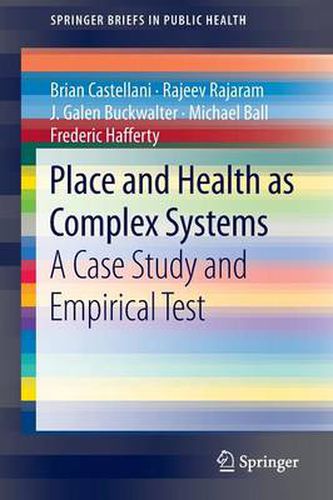Readings Newsletter
Become a Readings Member to make your shopping experience even easier.
Sign in or sign up for free!
You’re not far away from qualifying for FREE standard shipping within Australia
You’ve qualified for FREE standard shipping within Australia
The cart is loading…






This title is printed to order. This book may have been self-published. If so, we cannot guarantee the quality of the content. In the main most books will have gone through the editing process however some may not. We therefore suggest that you be aware of this before ordering this book. If in doubt check either the author or publisher’s details as we are unable to accept any returns unless they are faulty. Please contact us if you have any questions.
The history of public health has focused on direct relationships between problems and solutions: vaccinations against diseases, ad campaigns targeting risky behaviors. But the accelerating pace and mounting intricacies of our lives are challenging the field to find new scientific methods for studying community health. The complexities of place (COP) approach is emerging as one such promising method.
Place and Health as Complex Systems demonstrates how COP works, making an empirical case for its use in for designing and implementing interventions. This brief resource reviews the defining characteristics of places as dynamic and evolving social systems, rigorously testing them as well as the COP approach itself. The study, of twenty communities within one county in the Midwest, combines case-based methods and complexity science to determine whether COP improves upon traditional statistical methods of public health research. Its conclusions reveal strengths and limitations of the approach, immediate possibilities for its use, and challenges regarding future research. Included in the coverage:
Characteristics of places and the complexities of place approach. The Definitional Test of Complex Systems. Case-based modeling using the SACS toolkit. Methods, maps, and measures used in the study. Places as nodes within larger networks. Places as power-based conflicted negotiations.
Place and Health as Complex Systems brings COP into greater prominence in public health research, and is also valuable to researchers in related fields such as demography, health geography, community health, urban planning, and epidemiology.
$9.00 standard shipping within Australia
FREE standard shipping within Australia for orders over $100.00
Express & International shipping calculated at checkout
This title is printed to order. This book may have been self-published. If so, we cannot guarantee the quality of the content. In the main most books will have gone through the editing process however some may not. We therefore suggest that you be aware of this before ordering this book. If in doubt check either the author or publisher’s details as we are unable to accept any returns unless they are faulty. Please contact us if you have any questions.
The history of public health has focused on direct relationships between problems and solutions: vaccinations against diseases, ad campaigns targeting risky behaviors. But the accelerating pace and mounting intricacies of our lives are challenging the field to find new scientific methods for studying community health. The complexities of place (COP) approach is emerging as one such promising method.
Place and Health as Complex Systems demonstrates how COP works, making an empirical case for its use in for designing and implementing interventions. This brief resource reviews the defining characteristics of places as dynamic and evolving social systems, rigorously testing them as well as the COP approach itself. The study, of twenty communities within one county in the Midwest, combines case-based methods and complexity science to determine whether COP improves upon traditional statistical methods of public health research. Its conclusions reveal strengths and limitations of the approach, immediate possibilities for its use, and challenges regarding future research. Included in the coverage:
Characteristics of places and the complexities of place approach. The Definitional Test of Complex Systems. Case-based modeling using the SACS toolkit. Methods, maps, and measures used in the study. Places as nodes within larger networks. Places as power-based conflicted negotiations.
Place and Health as Complex Systems brings COP into greater prominence in public health research, and is also valuable to researchers in related fields such as demography, health geography, community health, urban planning, and epidemiology.